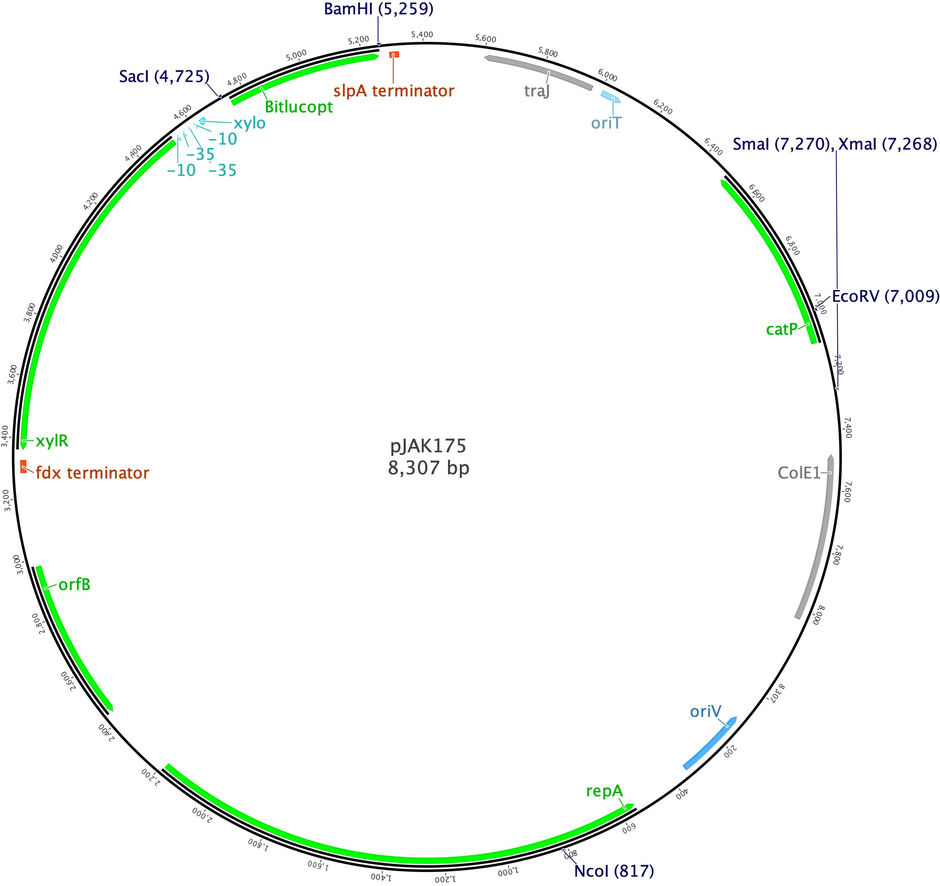pJAK175
(Plasmid
#178601)
-
PurposepAP259 derived plasmid encoding a xylose inducible BitlucOpt
-
Depositing Lab
-
Sequence Information
Ordering
| Item | Catalog # | Description | Quantity | Price (USD) | |
|---|---|---|---|---|---|
| Plasmid | 178601 | Standard format: Plasmid sent in bacteria as agar stab | 1 | $85 | |
Backbone
-
Vector backbonepAP259
-
Backbone manufacturerW. K. Smits, Leiden University Medical Center
- Backbone size w/o insert (bp) 6914
- Total vector size (bp) 8307
-
Modifications to backboneThe Ptet promoter in pAP259 has been replaced with the C. difficile-derived xylose-inducible promoter.
-
Vector typeBacterial Expression
Growth in Bacteria
-
Bacterial Resistance(s)Chloramphenicol, 25 μg/mL
-
Growth Temperature37°C
-
Growth Strain(s)DH5alpha
-
Copy numberUnknown
Gene/Insert
-
Gene/Insert nameBitlucopt
-
SpeciesSynthetic
- Promoter Pxyl
Cloning Information
- Cloning method Restriction Enzyme
- 5′ cloning site KpnI (not destroyed)
- 3′ cloning site SacI (not destroyed)
- 5′ sequencing primer CACCTCCTTTTTGACTTTAAGCCTACGAATACC (Common Sequencing Primers)
Resource Information
-
Supplemental Documents
Terms and Licenses
-
Academic/Nonprofit Terms
-
Industry Terms
- Not Available to Industry
Trademarks:
- Zeocin® is an InvivoGen trademark.
Depositor Comments
Please also cite:
Oliveira Paiva et al J Mol Biol. 2019 Jan 8. pii: S0022-2836(18)31160-4. doi: 10.1016/j.jmb.2019.01.001.
These plasmids were created by your colleagues. Please acknowledge the Principal Investigator, cite the article in which the plasmids were described, and include Addgene in the Materials and Methods of your future publications.
-
For your Materials & Methods section:
pJAK175 was a gift from Robert Fagan (Addgene plasmid # 178601 ; http://n2t.net/addgene:178601 ; RRID:Addgene_178601) -
For your References section:
Potential Role of the Host-Derived Cell-Wall Binding Domain of Endolysin CD16/50L as a Molecular Anchor in Preservation of Uninfected Clostridioides difficile for New Rounds of Phage Infection. Phothichaisri W, Chankhamhaengdecha S, Janvilisri T, Nuadthaisong J, Phetruen T, Fagan RP, Chanarat S. Microbiol Spectr. 2022 Apr 4:e0236121. doi: 10.1128/spectrum.02361-21. 10.1128/spectrum.02361-21 PubMed 35377223





